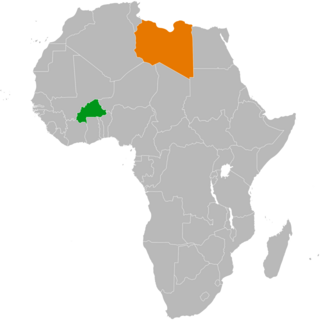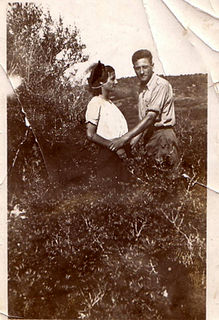 W
WMuammar Gaddafi became the de facto leader of Libya on 1 September 1969 after leading a group of young Libyan military officers against King Idris I in a bloodless coup d'état. After the king had fled the country, the Libyan Revolutionary Command Council (RCC) headed by Gaddafi abolished the monarchy and the old constitution and established the Libyan Arab Republic, with the motto "freedom, socialism and unity".
 W
WThe 1969 Libyan coup d'état, also known as the al-Fateh Revolution or the 1 September Revolution, was carried out by the Free Officers Movement, a group of military officers led by Colonel Muammar Gaddafi, which led to the overthrow of King Idris I.
 W
WThe Basic Peoples Congress, or Fundamental Popular Council, was the smallest unit of government in Libya under Muammar Gaddafi's Great Socialist People's Libyan Arab Jamahiriya. It usually governed the equivalent of a municipality, and that geographic subdivision was also called a Basic Peoples Congress.
 W
WBrigade 93 is one of many militias that formed in the wake of the Libyan Civil War. It is based in Bani Walid, a former stronghold of the Gaddafi regime. The militia is mainly composed of those still loyal to Gaddafi.
 W
WThe Brotherly Leader and Guide of the Revolution of the Great Socialist People's Libyan Arab Jamahiriya was a title held by former Libyan leader Muammar Gaddafi, who claimed to be merely a symbolic figurehead of the country's official governance structure. However, critics have long described him as a demagogue, referring to his position as the de facto former political office, despite the Libyan state's denial of him holding any power.
 W
WBurkina Faso–Libya relations refers to the current and historical relationship between State of Libya and the Republic of Burkina Faso. Libya maintains an embassy in the Burkinabé capital of Ouagadougou, and Burkina Faso one in the Libyan capital of Tripoli.
 W
WThe Declaration on the Establishment of the Authority of the People was brought into force on 2 March 1977 by the General People's Congress, in the name of the Arab people of the Libyan Arab Jamahiriya. This amendment to the constitution of 1969 would remain in force until the adoption of the interim constitution on 3 August 2011.
 W
WThe foreign relations of the Libyan Arab Jamahiriya (1969–2011) underwent much fluctuation and change. They were marked by severe tension with the West and by other national policies in the Middle East and Africa, including the Libyan government's financial and military support for numerous paramilitary and rebel groups.
 W
WThe General People's Committee, often abbreviated as the GPCO, was the executive branch of government during the era of the Libyan Arab Jamahiriya. It served as the intermediary between the masses and government leadership and was composed of a general secretary and twenty secretaries of some 600 local "basic popular congresses" (BPC), GPCO members were elected by the country's parliament, the General People's Congress, and had no fixed terms.
 W
WThe General People's Congress of Libya was the national legislature of Muammar Gaddafi's Great Socialist People's Libyan Arab Jamahiriya governance structure. It consisted of 2,700 representatives of the Basic People's Congresses. The GPC was the legislative forum that interacts with the General People's Committee, whose members are secretaries of Libyan ministries. It notionally served as the intermediary between the masses and the leadership and was composed of the secretariats of some 600 local "basic popular congresses."
 W
WThe Green Book is a short book setting out the political philosophy of Libyan leader Muammar Gaddafi. The book was first published in 1975. It was "intended to be read by all people". It is said to have been inspired in part by The Little Red Book. Both were widely distributed both inside and outside their country of origin, and "written in a simple, understandable style with many memorable slogans". An English translation was issued by the Libyan People's Committee, and a bilingual English/Arabic edition was issued in London by Martin, Brian & O'Keeffe in 1976. During the Libyan Civil War, copies of the book were burned by anti-Gaddafi demonstrators.
 W
WThe Italian refugees from Libya were the Italian colonists and their descendants who were forced out of Libya after the end of WWII. Most took refuge in Italy, mainly after their expulsion in 1970, ordered by Muammar Gaddafi.
 W
WThe Libyan Revolutionary Command Council was the twelve-person governing body that ruled the Libyan Arab Republic from 1969 to 1977. Its chairman was Muammar Gaddafi, who had the most influence.
 W
WFrom 1969 to early 2011, the politics of Libya were determined de facto by Muammar Gaddafi, who had been in power since his overthrow of the Kingdom of Libya in 1969.
 W
WThe Third International Theory, also known as the Third Universal Theory, was the style of government proposed by Muammar Gaddafi in the early 1970s, on which his government, the Great Socialist People's Libyan Arab Jamahiriya, was officially based. It was partly inspired by Islamic socialism, Arab nationalism, African nationalism and partly by the principles of direct democracy.